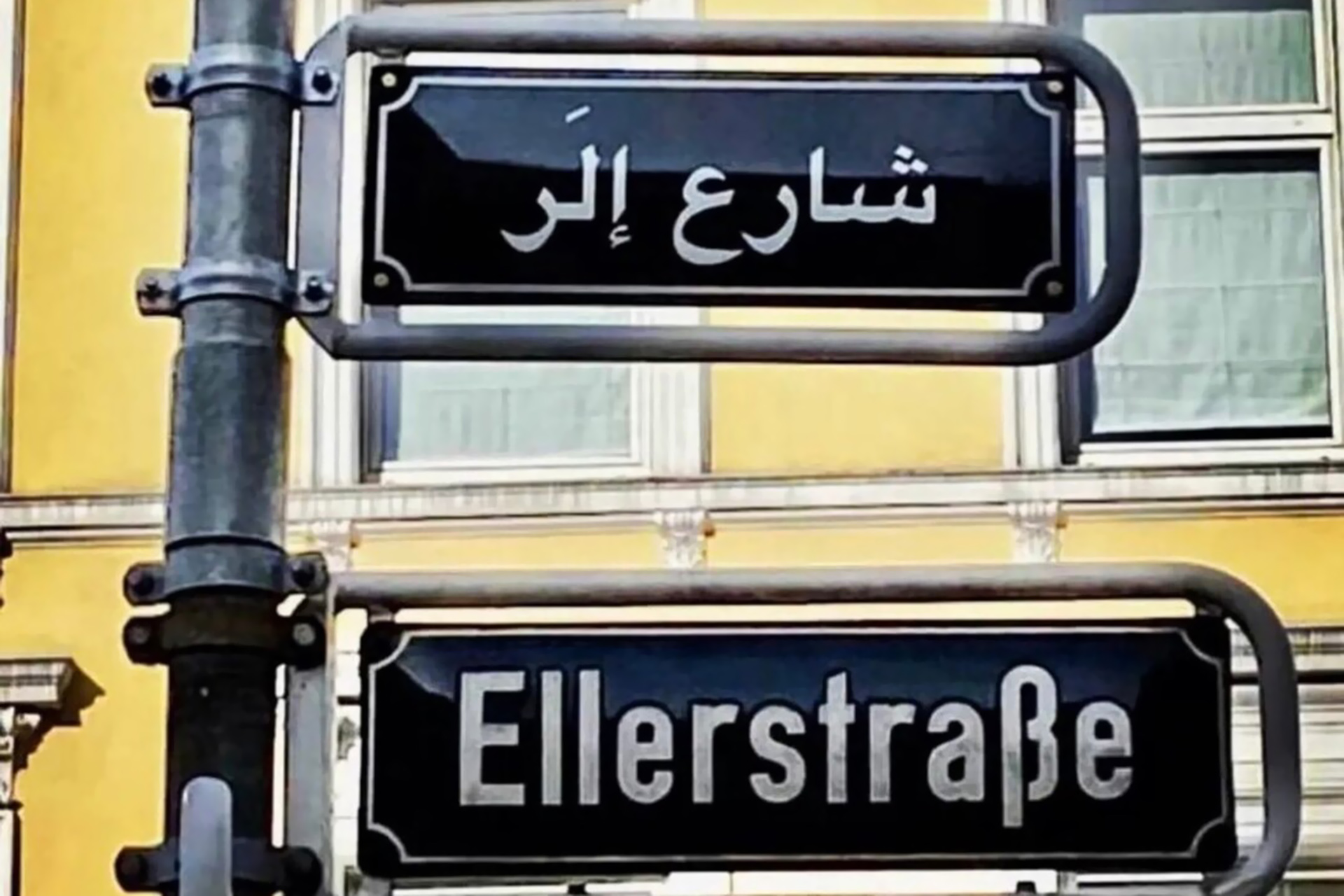An Arabic-language street sign in the German city of Düsseldorf sparked controversy across platforms, with the sign placed to express diversity and social inclusion, while activists claimed it would promote right-wing extremism.
Images of the sign, which was called "Eller Street" in Arabic, was widely circulated in the German digital space and was placed last Thursday on top of a sign in the name of the street in German, in the city, which is considered the capital of the state of North Rhine-Westphalia.
According to German media, the bilingual sign was placed in accordance with a decision by the city's integration council, which represents immigrants at the municipal level and seeks to integrate them into society and combat discrimination against them.
Street and diversity
According to German sources, the "Oberbilk" area, where the street is located, is full of people of Arab origin, and Moroccan in particular, and is characterized by restaurants, cafes and shops of Arab and Moroccan character.
The Green Party, which is the author of this initiative, pointed out that the city's bilingual street signs symbolize the region's social diversity and enhance communication between neighborhood residents and Arab communities, a sign of cohesion.
He stressed that bilingual street signs "reinforce vital links between immigrant communities and city neighbourhoods", adding: "We in Düsseldorf live together, not side by side. We always want to reinforce that and express it."
Sami Cherchira, a member of the Green Party and spokesman for integration policy in the city council, said the bilingual signs show people's identification with their area and reinforce their social responsibility.
Dietmar Wolff, a member of the Green Party and municipal representative in District 3 of the city, said, "Many people, families and merchants of Moroccan and Maghreb origin have lived in Oberbilik for generations. It is a colorful and diverse neighborhood. "The people who live there helped build our country, but they deserve respect and representation."
It is worth noting that this is not the first sign of the bilingual street signs initiative, as a sign in Japanese was hung on Emerman Street in the city due to the large presence of Japanese in it.
Ellerstraße in Düsseldorf/Oberbilk.
Die Arabisierung Deutschlands schreitet voran.
Deutsch ist die einzige Amtssprache in Deutschland. Weder Klingonisch noch Arabisch. pic.twitter.com/NgNE8tK9Pf
— Ali Utlu (@AliCologne) March 18, 2023
Responses and contrast
The initiative was met with mixed opinions and reactions, from welcome to the assertion that it promotes Arab culture and identity in the place, and others who claimed that it promotes right-wing extremism against Muslims, amid dissenting voices.
German journalist Tarek Bey described the Arabic sign as "a big step to promote culture", adding: "The first visiting workers from Morocco came to Düsseldorf 60 years ago. After 3 generations, you can't talk about them as guests, they are now the life of the neighborhood."
Die Ellerstraße in Düsseldorf hat nun ein arabisches Straßenschild. Und das ist ein großer Schritt für die Kultur. Vor 60 Jahren kamen die ersten Gastarbeiter aus Marokko nach Düsseldorf. Drei Generationen später kann von Gästen keine Rede sein. Sie sind das Leben des Viertels. pic.twitter.com/0IVqflL4s3
— Tarek Baé (@Tarek_Bae) March 16, 2023
"Broadening the horizon is a pioneering decision for Germany, because cultural openness deserves to be mentioned," he said.
For its part, the German Muslim platform "The Truth of Islam" wrote: "Even if the city of Düsseldorf has good intentions, we do not need Arab street signs, which would cause panic in right-wing conservative circles. We need an inclusive political acceptance of our values and identity as Muslims."
Auch wenn es von der Stadt Düsseldorf nett gemeint ist: Wir benötigen keine arabischen Straßenschilder, auf die dann die rechts-konservative Bubble ausrastet, sondern vielmehr bedarf es einer umfassenden politischen Akzeptanz unserer Werte und Identität als Muslime. pic.twitter.com/Q7ThlGVWaC
— Realität Islam (@islam_realitaet) March 18, 2023
German FDP politician Gerhard Babke denounced the presence of an Arab sign in a German neighborhood, saying it was "an expression of cultural self-abandonment."
In #Düsseldorf wird die #Ellerstraße jetzt auch auf Straßenschildern in arabischer Schrift gekennzeichnet! Ein Ratsmitglied der Grünen spricht laut Deutschlandfunk vom „symbolischen Ausdruck gesellschaftlicher Inklusion". Es ist wohl eher Ausdruck kultureller Selbstpreisgabe!
— Gerhard Papke (@PapkeGerhard) March 17, 2023
German activist Ali Outlaw saw the initiative as "an Arabization process for Germany," saying, "German is the only official language in Germany. Neither the Klingon (artificial language) nor Arabic."

